The skin is often referred to as the body’s largest organ, and for good reason. It serves as a protective barrier, regulates temperature, and reflects internal health. In the pursuit of radiant skin and lasting vitality, more people are turning to a natural skincare routine as part of a broader commitment to holistic wellness. Such a shift is not merely cosmetic; it represents a lifestyle transformation that unites outer beauty with inner health. For those seeking to align their skincare rituals with mindful, body-conscious practices, embracing natural and organic elements can pave the way toward both dermatological health and systemic well-being.
A natural skincare routine isn’t just about what we put on our skin; it’s also about how we care for our entire selves. When we focus on natural methods, ingredients, and rhythms that work in harmony with our bodies, we engage in an act of self-respect and health stewardship. Integrating these practices into daily life fosters not only clear, glowing skin but also improved sleep, balanced hormones, reduced inflammation, and even enhanced emotional stability. In this way, the skin becomes both a canvas and a mirror of our overall health, making natural skincare a vital pillar of whole-body wellness.
You may also like: How to Tone Your Body After Weight Loss: Expert Tips for Abs, Thighs, and Long-Term Muscle Definition
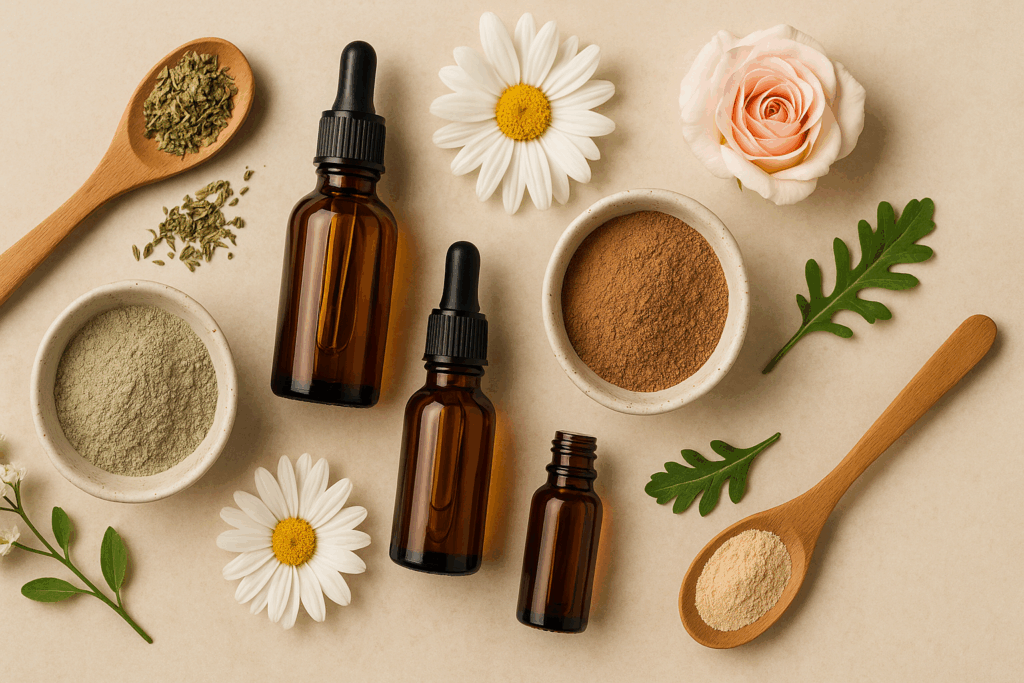
Understanding the Foundation of a Natural Skincare Routine
At its core, a natural skincare routine draws from ingredients and practices that are free from synthetic chemicals, preservatives, and harsh additives. Unlike conventional products laden with sulfates, parabens, and artificial fragrances, natural skincare relies on botanical oils, plant extracts, herbal infusions, and minerals that nurture the skin’s barrier without disrupting its microbiome. This approach respects the skin’s innate capacity for healing and regeneration, offering nourishment rather than suppression.
The philosophy behind this holistic skincare routine acknowledges that the skin is permeable. What we apply topically can, in many cases, enter the bloodstream and affect internal processes. Therefore, adopting a natural face care routine means curating products that are as safe and nutritious as the food we eat. Just as we avoid overly processed foods in a health-conscious diet, we can also avoid synthetic ingredients in our skincare.
To build a good natural skin care routine, one should begin with gentle cleansing using oil-based or herbal cleansers that preserve the lipid barrier. This is followed by toning with hydrosols or herbal teas that restore pH balance and prepare the skin for moisturization. Moisturizing with natural butters, oils, or plant-based serums supports hydration without clogging pores. Consistent exfoliation using fruit enzymes or natural scrubs aids in cell turnover while avoiding irritation. Finally, sun protection with mineral-based sunscreen completes the ritual, ensuring that the skin remains safeguarded against environmental stressors.
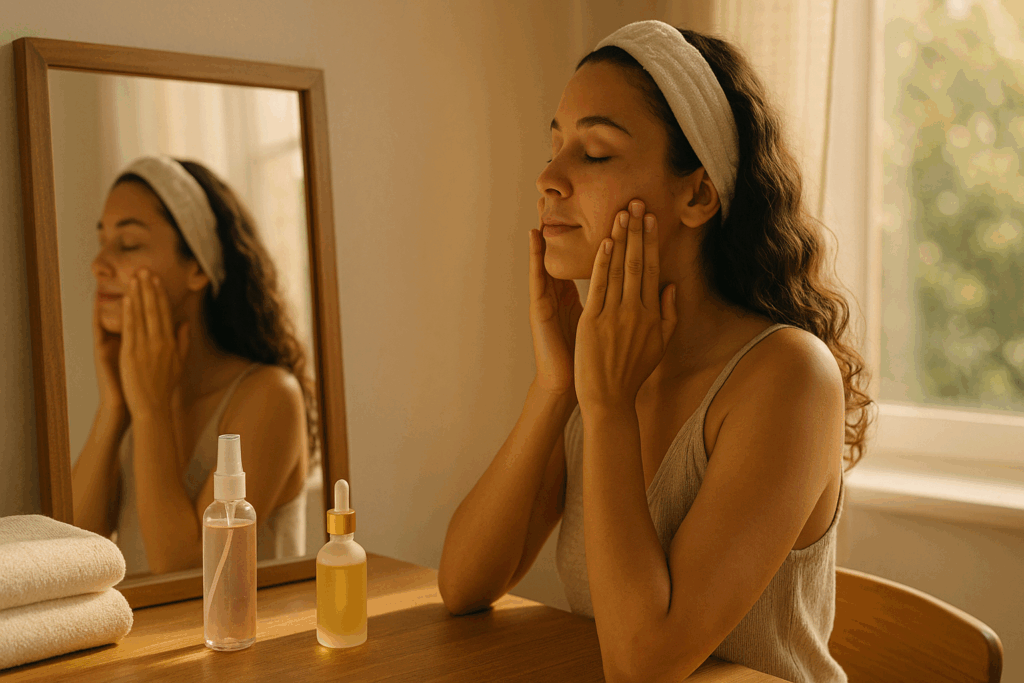
How Daily Skin Care Routine at Home Naturally Enhances Skin Health
When practiced consistently, a daily skin care routine at home naturally encourages the skin to thrive. The predictability of daily rituals, anchored in plant-based care, can reduce chronic inflammation and oxidative stress—two major contributors to premature aging and skin dysfunction. A routine that is repeated at morning and night also supports circadian rhythms, which govern not only sleep cycles but also the skin’s repair processes.
In the morning, the emphasis is on protection and preparation. A natural face regimen might begin with a lukewarm water cleanse, followed by a spritz of rosewater or chamomile hydrosol. Lightweight moisturizers containing aloe vera or jojoba oil hydrate the skin without heaviness, while antioxidant-rich serums with green tea or vitamin C defend against free radicals. Mineral sunscreens with zinc oxide provide essential UV protection without disrupting hormone balance, unlike some chemical alternatives.
Evening rituals focus on cleansing and repair. Double cleansing with a gentle oil, such as sweet almond or grapeseed, removes makeup and debris, while a second cleanse with a botanical gel or clay purifies pores. Night creams with shea butter, calendula, or sea buckthorn support barrier repair, while herbal infusions in toners and masks encourage detoxification and renewal. By repeating these rituals daily, we train our skin to respond with increased elasticity, resilience, and luminosity.
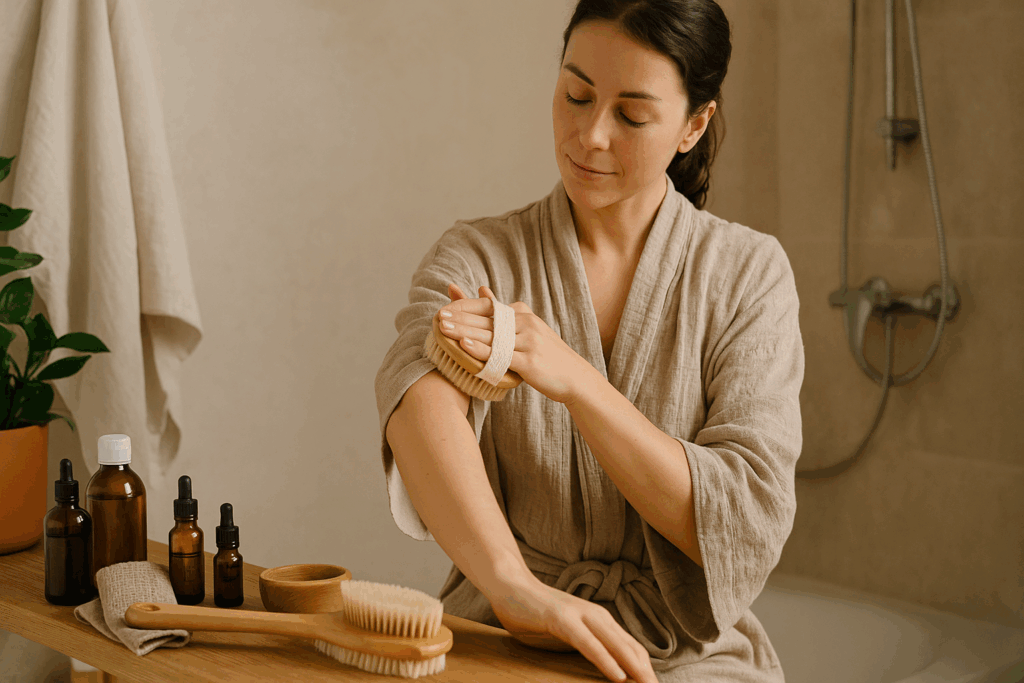
Integrating Whole-Body Practices with Your Natural Skincare Routine
A truly holistic skincare routine goes beyond the surface to include body-wide practices that harmonize with external care. The lymphatic system, for example, plays a vital role in skin health by eliminating waste and transporting immune cells. Dry brushing before showering stimulates lymphatic flow, increases circulation, and gently exfoliates the skin. Similarly, regular movement—especially yoga, dance, or walking—promotes healthy blood flow and oxygenation, which enhance the skin’s vitality.
Hydration and nutrition are equally critical. A best natural skin routine cannot exist independently of the body’s internal environment. Consuming water-rich foods, herbal teas, and mineral-dense broths supports cellular hydration and collagen formation. Specific nutrients such as omega-3 fatty acids, vitamin A, and zinc are essential for preventing dryness, inflammation, and breakouts. Herbal adaptogens like ashwagandha and holy basil help regulate stress hormones that often manifest on the skin.
Sleep and stress management further complete the picture. Chronic sleep deprivation weakens the skin barrier and accelerates aging, while unregulated stress increases cortisol, which can lead to inflammation and sensitivity. Meditation, mindful breathing, and adequate rest are non-negotiable elements of a good natural skin care routine, as they create the internal conditions necessary for external radiance.
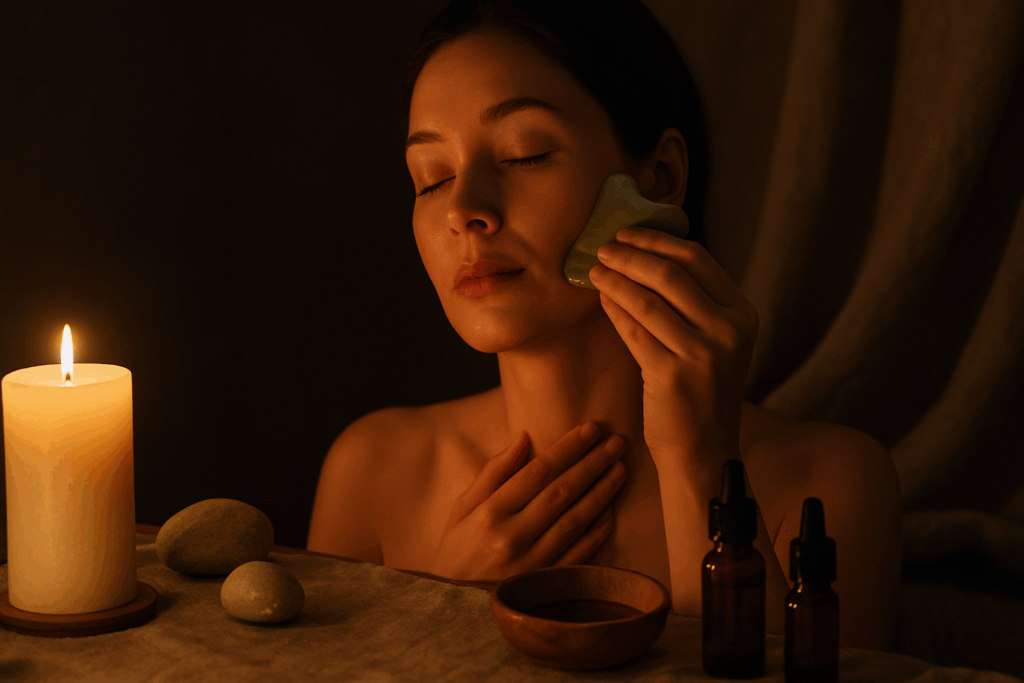
The Role of Ritual in Cultivating a Holistic Skincare Routine
Rituals are not merely routines; they are meaningful acts performed with intention and presence. Incorporating ritual into skincare turns a mundane task into a sacred practice of self-nurture. Lighting a candle, using warm towels, playing soft music, or setting a calming intention before applying natural oils transforms skincare from obligation to nourishment.
This approach aligns with ancient traditions where beauty was not separate from health or spirituality. In Ayurveda, for instance, abhyanga—the ritual of self-massage with warm oil—is a daily practice believed to balance doshas, stimulate lymphatic drainage, and maintain skin softness. Similarly, Traditional Chinese Medicine views the skin as a reflection of internal harmony, and facial gua sha or acupressure is used not only for cosmetic benefit but also to support organ health.
Making space for ritual helps us slow down and connect with our bodies. It builds self-awareness and encourages a mindful relationship with our appearance, moving us away from perfectionism and toward self-compassion. In this way, a holistic skincare routine is also a psychological and emotional investment, one that supports self-esteem and resilience in addition to physical beauty.
Choosing Ingredients for the Best Natural Skincare Routine
Selecting ingredients for your routine requires discernment and curiosity. Not all products labeled “natural” are free from harmful additives. Reading labels and understanding the origin and purpose of ingredients empowers consumers to make informed decisions that align with their health goals. Look for certified organic, cruelty-free, and sustainably sourced items to ensure ethical and effective care.
Botanicals such as calendula, chamomile, lavender, and rose offer anti-inflammatory, antimicrobial, and soothing properties. Carrier oils like argan, hemp seed, and marula deliver essential fatty acids and vitamins, supporting hydration and elasticity. Clay varieties—such as kaolin, bentonite, and French green clay—gently draw out impurities while offering mineral support. Aloe vera, a classic remedy for skin care at home, provides cooling hydration and accelerates healing.
Adaptogenic herbs and mushrooms are increasingly integrated into modern formulations. Reishi, licorice root, and centella asiatica (gotu kola) help balance skin tone, repair damage, and calm redness. For a truly best all natural skin care routine, avoid ingredients such as artificial dyes, alcohols, petroleum derivatives, and synthetic fragrances, as these can compromise the skin’s integrity over time.
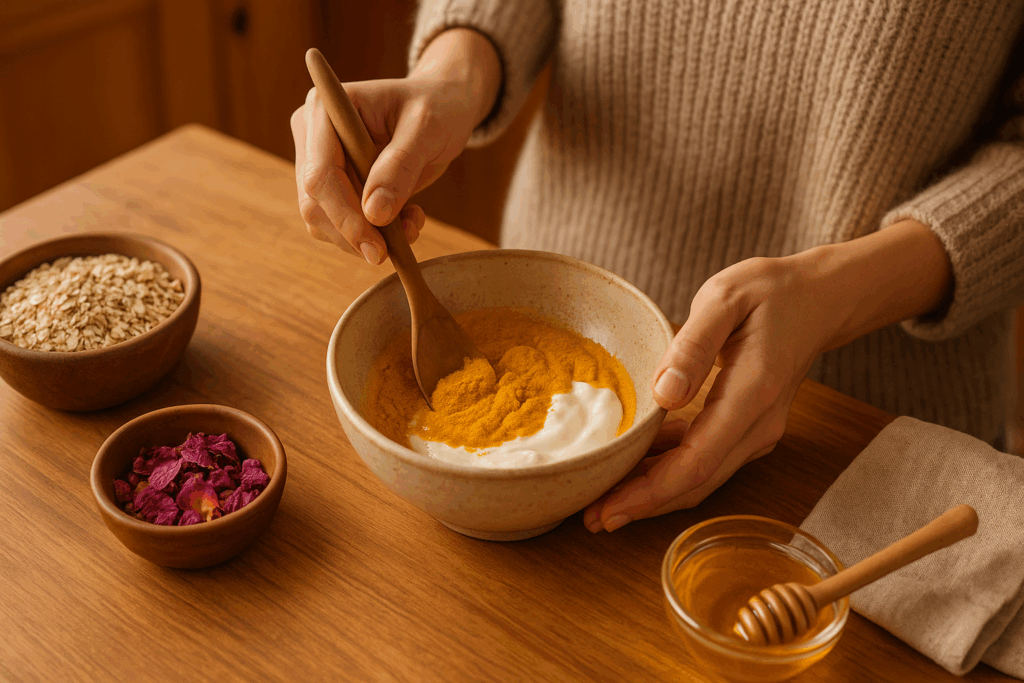
Crafting Your Own Organic Skincare Routine at Home
There is something deeply empowering about creating your own natural skin care regimen from scratch. With a few staple ingredients and some basic techniques, one can formulate personalized blends that cater to specific skin needs. Homemade remedies for glowing skin not only save money but also deepen one’s connection to the ingredients and the process.
A simple cleanser can be made from honey and oats. Honey is naturally antibacterial and humectant, while finely ground oats soothe inflammation and remove debris. A refreshing toner might combine green tea with a few drops of witch hazel or cucumber juice. Moisturizers made from whipped shea butter blended with jojoba or rosehip oil deliver rich hydration, and a nighttime serum infused with chamomile, vitamin E, and carrot seed oil provides rejuvenating benefits.
Face masks crafted from yogurt, turmeric, clay, or avocado can be used weekly to enhance brightness and clarity. These natural face routine elements not only nurture the skin but also offer sensory pleasure, turning skincare into a joyful, creative practice. By using simple, recognizable ingredients, we reduce our exposure to allergens and irritants while maximizing the benefits of nature’s pharmacy.
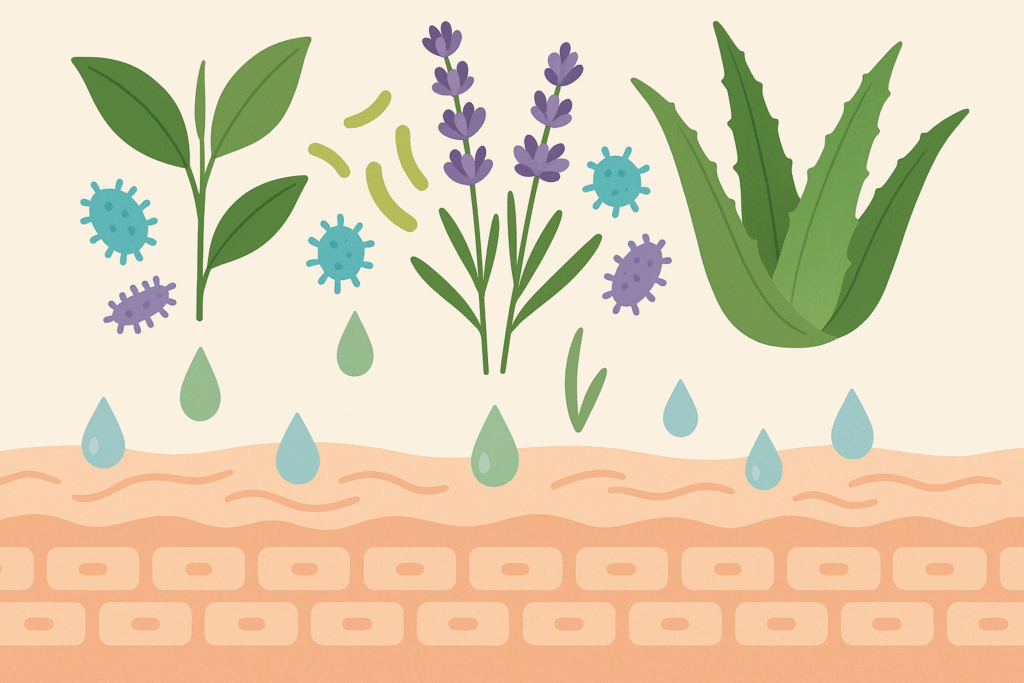
The Science Behind a Holistic Skin Care Routine
While the appeal of natural skincare often arises from intuition and tradition, emerging science supports many of its principles. The skin’s microbiome, for instance, is now recognized as a key factor in barrier health, immune regulation, and inflammation. Disrupting this microbiome with harsh cleansers or antibiotics can lead to issues such as eczema, acne, and sensitivity. A holistic skin care routine that nurtures this microbial ecosystem with prebiotics and botanicals can restore balance and prevent flare-ups.
Scientific studies have also validated the antioxidant, anti-inflammatory, and antimicrobial effects of numerous plant compounds. Green tea polyphenols, for example, have been shown to reduce sebum production and protect against UV-induced damage. Essential oils like tea tree, rosemary, and lavender have documented efficacy in managing acne and bacterial overgrowth. These findings lend credibility to what traditional systems of medicine have long practiced intuitively.
Integrating science and tradition allows for an informed, evidence-based approach to natural skincare. This synergy ensures that rituals are not only nurturing and enjoyable but also effective and supported by research. It validates the wisdom of generations past while making space for innovation and customization in contemporary skincare routines.
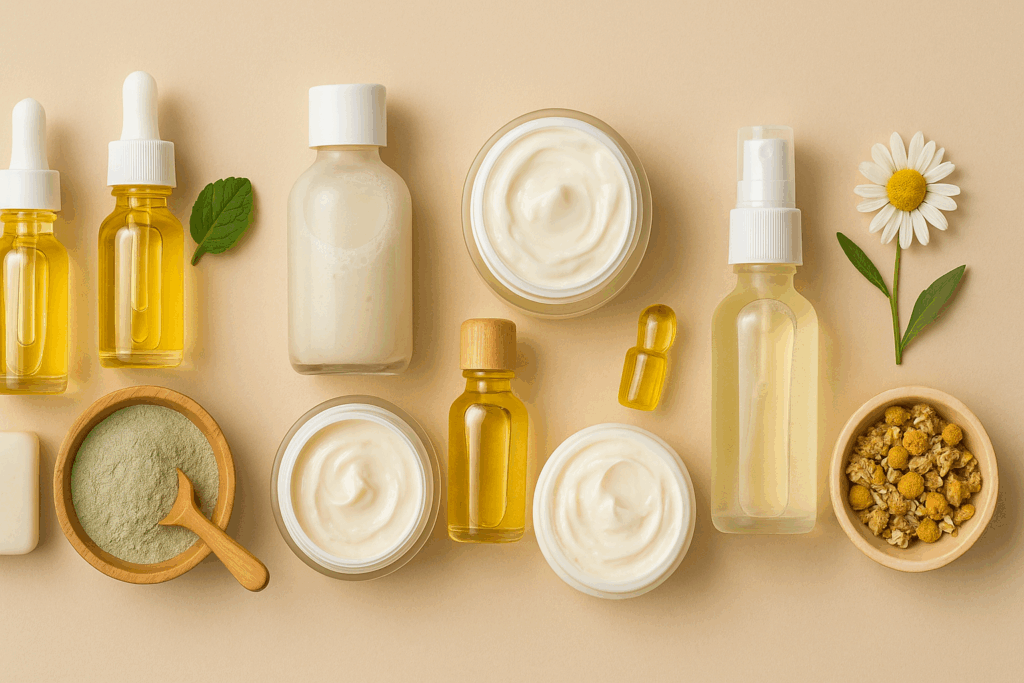
Designing the Best Natural Face Care Routine for Your Skin Type
Skin types vary widely, and the best natural face care routine is one that adapts to individual needs. For oily or acne-prone skin, lightweight oils like grapeseed or hemp seed combined with clarifying herbs such as thyme and witch hazel offer balance without stripping natural oils. Clay masks with charcoal or bentonite draw out excess sebum and reduce congestion.
Dry or mature skin benefits from richer emollients such as avocado oil, macadamia nut oil, and plant butters. Hydrating toners with rose or neroli and serums containing hyaluronic acid derived from fermented plants improve moisture retention and smooth texture. Regular gentle exfoliation with fruit enzymes like papaya or pineapple supports cell renewal without causing microtears.
Sensitive skin requires minimal, soothing ingredients. Calendula, oat extract, cucumber, and chamomile are excellent choices. Fragrance-free, non-comedogenic products prevent irritation. Building a natural skin care regimen around these calming botanicals helps restore barrier function and reduce redness. The key is to observe how your skin responds and adjust formulations accordingly, embracing flexibility as part of the routine.
Benefits of a Natural Skincare Routine for Long-Term Health
The advantages of maintaining a consistent natural skincare routine go beyond cosmetic improvements. Over time, this approach can support endocrine health, reduce toxic burden, and enhance emotional well-being. By avoiding xenoestrogens and hormone-disrupting chemicals commonly found in conventional products, we protect the body’s delicate hormonal balance, which affects everything from menstrual regularity to mood stability.
Chronic exposure to environmental toxins and pollutants can compromise liver function, immunity, and cellular health. Opting for a natural face care regimen minimizes this load, allowing the body to function more efficiently. The cumulative effect of choosing clean ingredients contributes to reduced inflammation, fewer allergic reactions, and a more vibrant complexion.
Emotionally, natural skincare fosters a relationship of trust and self-kindness. Instead of fighting or correcting the skin, we partner with it. This shift reduces stress, improves body image, and enhances daily satisfaction. In this sense, a holistic skincare routine becomes a cornerstone of self-care, confidence, and resilience in a world that often promotes unattainable beauty standards.
The Future of Natural Skincare: Innovation Meets Tradition
As consumer awareness grows, the natural skincare industry continues to evolve, blending ancient practices with modern innovation. Biocompatible formulations, plant-based biotechnology, and sustainable packaging are shaping the future of skincare. Brands are exploring fermented botanicals, stem cell extracts from plants, and zero-waste manufacturing to align with both ecological values and efficacy.
Personalization is also becoming central. Digital skin analysis, AI-driven product recommendations, and DIY kits enable users to customize their natural skin regimen with precision. This intersection of technology and tradition allows for highly effective care that still honors the principles of minimalism, transparency, and integrity.
At the same time, there is a growing emphasis on community knowledge. Herbalism, ancestral medicine, and indigenous skincare wisdom are receiving renewed respect, with practitioners and consumers alike recognizing their contributions to holistic health. In reclaiming these traditions, the best natural skincare routine becomes not just a personal act but a cultural and ecological statement.
Frequently Asked Questions About Building a Holistic and Natural Skincare Routine
How can I personalize a natural skincare routine for different climates or seasons?
A natural skincare routine should always adapt to environmental changes, especially those brought on by seasonal or geographic shifts. In colder climates or during winter, the skin tends to lose more moisture, requiring a richer natural face care routine that includes heavier emollients like shea butter or avocado oil to combat dryness and wind exposure. Conversely, in humid or hot climates, lighter oils such as squalane or jojoba and refreshing hydrosols like peppermint or rose water help regulate sebum production and cool the skin. For those living in polluted urban environments, incorporating antioxidants like green tea extract and vitamin C into your natural skin care regimen can help counteract oxidative stress. Adjusting your organic skincare routine based on these factors enhances the skin’s ability to remain balanced, healthy, and resilient throughout the year.
What are the social and psychological benefits of adopting a holistic skincare routine?
Beyond physical improvements, a holistic skincare routine fosters a deeper connection between self-care and emotional wellbeing. Committing to a daily skin care routine at home naturally creates structured time for mindfulness and introspection, which can reduce anxiety and boost confidence. The tactile rituals of massaging oils or applying masks can ground individuals in the present moment, enhancing their sense of control and self-worth. Socially, cultivating a natural face regimen often leads to reduced reliance on makeup or cosmetic enhancements, encouraging authenticity and self-acceptance. Over time, a best natural face care routine becomes not just about skincare but also about celebrating individuality and creating a sustainable, self-honoring identity.
What ingredients should be avoided even in products labeled ‘natural’?
Even within the realm of so-called natural products, there are several ingredients to avoid if your goal is a good natural skin care routine. Fragrance, even when derived from essential oils, can be irritating or allergenic for sensitive skin types. Similarly, alcohol-based formulations can strip the skin’s protective barrier and lead to dryness or inflammation, disrupting the balance of a holistic skin care routine. Some essential oils like citrus or cinnamon can cause photosensitivity or irritation when applied without proper dilution. Additionally, products that include poorly regulated or non-organic preservatives can still introduce synthetic compounds that interfere with a clean, organic skincare routine. Always research ingredient lists and choose certified, transparent brands when creating your best all natural skin care routine.
How does a natural skincare routine support hormonal balance and endocrine health?
Many conventional skincare products contain endocrine-disrupting chemicals such as phthalates, parabens, and synthetic musks. These compounds mimic hormones and can interfere with the body’s endocrine system, potentially contributing to imbalances like irregular menstruation, thyroid dysfunction, or mood swings. A shift to an all natural skin routine removes these compounds from daily exposure and can be an important step in reducing cumulative toxic burden. Ingredients in a natural face routine such as evening primrose oil or chamomile also possess hormone-regulating properties, supporting both skin and systemic equilibrium. When used consistently as part of a holistic skincare routine, these natural alternatives allow the body’s hormonal rhythms to stabilize, enhancing skin clarity, reducing breakouts, and fostering long-term vitality.
What are some advanced, lesser-known homemade remedies for glowing skin?
While many people are familiar with masks made of honey or yogurt, there are more specialized homemade remedies for glowing skin that offer deeper nourishment. A blend of pearl powder and rosehip oil creates a brightening treatment rich in minerals and vitamin A, perfect for dull or uneven complexions. Fermented rice water, rich in amino acids and antioxidants, can be used as a toner to improve elasticity and clarity within a natural face care routine. A mask made of banana peel, turmeric, and aloe vera soothes inflammation while enhancing skin texture. Incorporating matcha and chlorella into clay masks introduces chlorophyll and detoxifying enzymes that support a vibrant, youthful glow. These remedies expand the natural skin care advice toolkit, allowing customization that reflects your skin’s evolving needs.
How can I make a natural skincare routine sustainable and eco-friendly?
Sustainability is an integral part of any good natural skin care routine. Choose brands that utilize minimal, recyclable packaging or offer refills, reducing single-use plastic waste. Homemade products made from kitchen staples reduce carbon footprints and eliminate the need for shipping and production. Reusable cloth rounds, bamboo applicators, and compostable sponges also support a more sustainable organic skin care routine. Opting for local, seasonal botanical ingredients—such as calendula in summer or pumpkin seed oil in autumn—also aligns your routine with nature’s cycles and reduces environmental strain. When sustainability becomes part of your natural skin regimen, you not only protect your body but also contribute to planetary health.
How does a natural skincare routine benefit aging skin differently than conventional anti-aging products?
While many mainstream anti-aging products rely on synthetic retinoids, silicones, and peptides for quick results, they can sometimes compromise skin barrier function or lead to irritation. A natural skincare routine prioritizes long-term health by using plant-based ingredients like bakuchiol (a natural retinol alternative), sea buckthorn, and hibiscus, which stimulate collagen production without triggering sensitivity. These botanicals also support cellular regeneration while delivering essential antioxidants, which protect the skin from oxidative damage—a major cause of premature aging. Furthermore, integrating lymphatic massage or gua sha into your natural face regimen can boost circulation and muscle tone, naturally lifting and firming the skin over time. Unlike conventional regimens that chase fast results, a holistic skincare routine nurtures aging skin with dignity, grace, and patience.
What are the emerging trends shaping the future of the best natural skincare routine?
The evolution of the best natural skincare routine is increasingly shaped by biotechnology and regenerative agriculture. Bio-fermented botanicals, such as fermented algae or wild-harvested mushrooms, are being studied for their enhanced bioavailability and ability to repair damaged skin. Regenerative farming practices used to source ingredients not only yield more potent plant extracts but also restore soil health and biodiversity. AI-driven skin diagnostics now help individuals craft a personalized natural skin care regimen tailored to their microbiome and environment. Additionally, waterless skincare products are gaining popularity, using concentrated botanical essences that minimize waste and maximize efficacy. These innovations allow the best natural skin routine to be simultaneously modern, high-performance, and environmentally conscious.
How can I transition from conventional skincare to an organic skin care routine without irritating my skin?
Transitioning to an organic skincare routine should be a gradual and intentional process. Begin by replacing one product at a time, starting with those that stay on the skin the longest, such as moisturizers or serums. During the first few weeks, your skin may undergo a detox period, sometimes resulting in breakouts or dryness as it adjusts. Support this phase by incorporating soothing remedies for skin care like calendula balm or green tea compresses. Avoid layering too many new products at once, and give each change at least two weeks to observe its effects. By moving slowly and mindfully, you allow your skin to rebalance, adapt, and ultimately thrive within your natural skincare routine.
What role does community and tradition play in shaping a natural face care routine?
Cultural wisdom and ancestral knowledge have long guided the development of natural skincare practices. From the use of black soap and shea butter in West African traditions to the inclusion of rice bran oil and seaweed in Japanese rituals, time-honored remedies form the backbone of many effective natural skin care routine techniques. Community-based learning—whether through workshops, herbal apprenticeships, or online forums—encourages the sharing of remedies for skin care that are both locally accessible and culturally meaningful. Engaging with traditional practices fosters a deeper sense of belonging and reverence for the plants and rituals that have supported beauty across generations. Embedding your natural face care routine within this context of shared wisdom adds not just depth but continuity to your personal wellness journey.
Reflecting on the Power of Ritual and the Rewards of Natural Skincare
Embracing a natural skincare routine that supports whole-body wellness is a profound and empowering choice. It is a lifestyle that champions sustainability, self-respect, and intentional living. By integrating clean, plant-based ingredients with body-wide practices such as sleep, movement, and nutrition, we cultivate an environment where true beauty can emerge—not from surface corrections, but from systemic harmony.
The process is not about perfection or instant results. It is a slow, unfolding relationship with ourselves and the natural world. As we align our routines with the rhythms of the earth and our own bodies, we rediscover a sense of sovereignty and grace. A holistic skincare routine, then, becomes more than a collection of products or steps. It becomes a ritual of resilience, a mirror of wellness, and a celebration of what it means to be truly well, inside and out.
A natural skincare routine is more than a cosmetic commitment—it is a declaration of respect for the body, the planet, and the ancient wisdom that connects them. As we move toward more sustainable, mindful practices, we invite beauty to unfold not only on the surface but deep within our cells and spirits. This journey of holistic skincare encourages us to tune into our needs, listen to our skin’s subtle messages, and support our bodies with integrity and kindness. When we embrace this integrative approach, we foster a life that is not only more beautiful but more balanced, grounded, and healthful in every sense. In honoring the rituals of natural care, we ultimately cultivate a deeper harmony with ourselves and the world around us.
Further Reading:
The Ultimate 9-Step Natural Skin Care Routine
Nourish your skin: a guide to natural and organic skincare routine